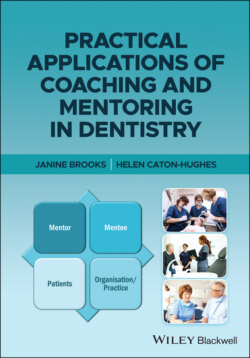Читать книгу Practical Applications of Coaching and Mentoring in Dentistry - Janine Brooks - Страница 10
1 Introduction
ОглавлениеThis book principally concerns itself with practical applications of mentoring within the profession of dentistry in the United Kingdom (UK). Whilst the book is written to showcase case studies within dentistry in the UK it is important to acknowledge that the skills of both dental professionals and mentors are not dissimilar throughout the world. If you are working outside the UK whether in dentistry or different field you will find much that you can take away from the book and the case studies. It is also important to acknowledge that whilst the case studies relate to dentists, their application is equally valid for all dental professionals.
The inspiration for the book came from students who have completed our post graduate certificate and award qualifications in mentoring and coaching. They are hard‐working dental professionals with a passion for both dentistry and mentoring and we are indebted to their contributions. Future students will be directed to this publication as a course book, however it is not limited to being a course text.
We provide a number of case studies for projects which showcase how mentoring is being utilised in positive ways to enhance individuals and the services those individuals provide. The aim is to demonstrate how mentoring programmes can be implemented and the benefits they can bring. We invite you to submit your own case study examples to our website at www.dentalcoachingacademy.co.uk.
Whilst mentoring is a practical intervention it is underpinned by sound theory and the acquisition of mentoring skills. We have included chapters that describe mentoring and coaching as the two interventions share a number of skill areas, yet are quite different in purpose and application. We have also included a chapter on mentoring and coaching tools and models with particular attention to a model that we have successfully used in our training programmes. The discussion chapter will review topics that the case studies have introduced and other aspects that we hope will provoke further thought.
Please note: for readers outside the UK or those who are not dental professionals, organisations within the UK that relate to dentistry may read like alphabet soup. We refer you to the glossary for a brief explanation of the organisations and terminology used. Please also note that, unless we make specific distinctions, we use terms like ‘coach’ and ‘mentor’ interchangeably, as we hold no attachment to the terms in their general usage. If you want to ‘coach’ someone, that's great; if you prefer to ‘mentor’ them, that's fine too. Both are possible as dental professionals supporting others' growth and development in general terms; or when we are acting as managers and leaders and drawing on coaching and mentoring skills generally. Where we make distinctions is when these skills are applied in professional settings and a precise tool, or approach is required by the context.
Mentoring is increasingly being seen by organisations generally, and the dental profession in particular, as a way of helping and supporting the development of people (employees, staff, contractors, patients) to achieve their goals. The word mentor has come to mean trusted adviser, friend, teacher, and wise person. The term ‘coach’ has been more commonly associated with someone supporting personal and professional performance, goal achievement, and drive. We aim to broaden both these terms to encompass enhanced self‐awareness, development, personalised learning, and excellence in practise.
In dentistry we are still at the beginning of appreciating the potential and benefits of mentoring. In our experience more and more dental professionals are undertaking training to become mentors, such that these skills are applied more intentionally and more professionally. As will become evident as you read through the book, great mentors combine skill, expertise, and experience with the skills of mentoring in the service of another individual, the mentee. The practical skills, expertise, and experience that others wish to learn and emulate will not be covered by the book, they are taken as present. What the book does cover are the skills of translating that expertise and experience into a worthwhile, productive conversation, and relationship that promotes growth and development of another individual, the mentee.
